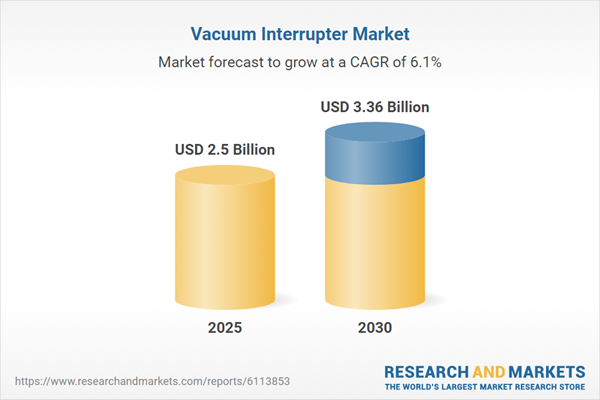Vacuum interrupters are critical components in vacuum circuit breakers, used to interrupt fault currents in utility power transmission, power generation, and distribution systems across industries like railways and industrial plants. Their demand is driven by the need for robust electrical circuit protection to prevent losses from overloads, growing applications in railway circuit breakers, and eco-friendly attributes.
Market Trends
The market is propelled by the increasing reliance on vacuum interrupters in advanced circuit protection devices, such as load break switches and reclosers, which manage load currents and automatically handle overloads or faults. A significant trend is their growing use in railway circuit breakers, fueled by global railway infrastructure expansion, particularly in Asia. Key projects driving demand include:- High Speed 2 Phase I (UK): London-Birmingham/Lichfield, started in 2019, expected completion by 2026.
- Moscow-Kazan High-Speed Line (Russia): Set for completion in 2024, part of Indonesia’s first mass rapid transit system.
- Brisbane Cross River Rail (Australia): Spanning Dutton Park to Bowen Hills, started in 2019, targeted for 2024 completion.
- Dongguan Line 3 (China): A 66.2 km railway under construction in Dongguan.
Growth Drivers
- Industrial Expansion: Growth in utilities, oil & gas, construction, and transportation sectors drives demand for vacuum circuit breakers, which rely on vacuum interrupters. Rising project activity in these industries, alongside transmission and distribution network development, supports market growth. Vacuum interrupters reduce energy wastage, lower transmission costs, and enhance safety, making them a preferred choice.
- Rising Electricity Demand: Rapid industrialization and urbanization have increased electricity consumption, necessitating protective devices like vacuum interrupters to prevent short circuits. Their applications are prominent in medium-voltage systems, with growing use in high-voltage scenarios.
- Macroeconomic Factors: Population growth, urbanization, and rising incomes increase demand for electricity, oil, and infrastructure. Migration to developed countries further amplifies the need for reliable power systems, indirectly boosting vacuum interrupter sales.
- Environmental Benefits: Vacuum interrupters are eco-friendly, recyclable, and free of gas insulation, aligning with global environmental concerns. This shift from gas-based interrupters enhances their appeal, as manufacturers prioritize energy-efficient, low-carbon equipment.
Challenges
- High Costs and Malfunctions: Vacuum interrupters are costlier than alternatives and prone to malfunctions, which may deter adoption. However, ongoing technological advancements are expected to mitigate these issues.
- Awareness and Policy Gaps: Limited awareness of vacuum interrupters and inadequate government policies could hinder market growth.
Geographical Outlook
The Asia Pacific region is poised for significant growth, driven by rising incomes, electricity consumption, and manufacturing activity in countries like India and China. The Americas will also hold a substantial share due to extensive government-led construction and transportation projects.Key Benefits of this Report:
- Insightful Analysis: Gain detailed market insights covering major as well as emerging geographical regions, focusing on customer segments, government policies and socio-economic factors, consumer preferences, industry verticals, and other sub-segments.
- Competitive Landscape: Understand the strategic maneuvers employed by key players globally to understand possible market penetration with the correct strategy.
- Market Drivers & Future Trends: Explore the dynamic factors and pivotal market trends and how they will shape future market developments.
- Actionable Recommendations: Utilize the insights to exercise strategic decisions to uncover new business streams and revenues in a dynamic environment.
- Caters to a Wide Audience: Beneficial and cost-effective for startups, research institutions, consultants, SMEs, and large enterprises.
What do businesses use our reports for?
Industry and Market Insights, Opportunity Assessment, Product Demand Forecasting, Market Entry Strategy, Geographical Expansion, Capital Investment Decisions, Regulatory Framework & Implications, New Product Development, Competitive IntelligenceReport Coverage:
- Historical data from 2022 to 2024 & forecast data from 2025 to 2030
- Growth Opportunities, Challenges, Supply Chain Outlook, Regulatory Framework, and Trend Analysis
- Competitive Positioning, Strategies, and Market Share Analysis
- Revenue Growth and Forecast Assessment of segments and regions including countries
- Company Profiling (Strategies, Products, Financial Information, and Key Developments among others).
Segmentation:
By Voltage
- Up to 15 kV
- 15 to 30 kV
- Greater than 30 kV
By Distribution Channel
- Online
- Offline
By Application
- Circuit Breaker
- Load Breaker
- Reclosers
- Tap-Changer
- Others
By End-User
- Oil & Gas
- Mining
- Power & Utilities
- Transportation
- Others
By Geography
- North America
- USA
- Canada
- Mexico
- South America
- Brazil
- Argentina
- Others
- Europe
- UK
- Germany
- France
- Italy
- Spain
- Others
- Middle East and Africa
- Saudi Arabia
- UAE
- Israel
- Others
- Asia Pacific
- Japan
- China
- India
- South Korea
- Taiwan
- Thailand
- Indonesia
- Others
Table of Contents
Companies Mentioned
- ABB
- Siemens AG
- Chengdu Xuguang Electronics Co., Ltd
- Toshiba Corporation
- Eaton Corporation
- Meidensha Corporation
- CG Power and Industrial Solutions Ltd
- Mitsubishi Electric Corporation
- Schneider Electric SE
- GreenStoneUSA
Table Information
| Report Attribute | Details |
|---|---|
| No. of Pages | 140 |
| Published | June 2025 |
| Forecast Period | 2025 - 2030 |
| Estimated Market Value ( USD | $ 2.5 Billion |
| Forecasted Market Value ( USD | $ 3.36 Billion |
| Compound Annual Growth Rate | 6.0% |
| Regions Covered | Global |
| No. of Companies Mentioned | 10 |









